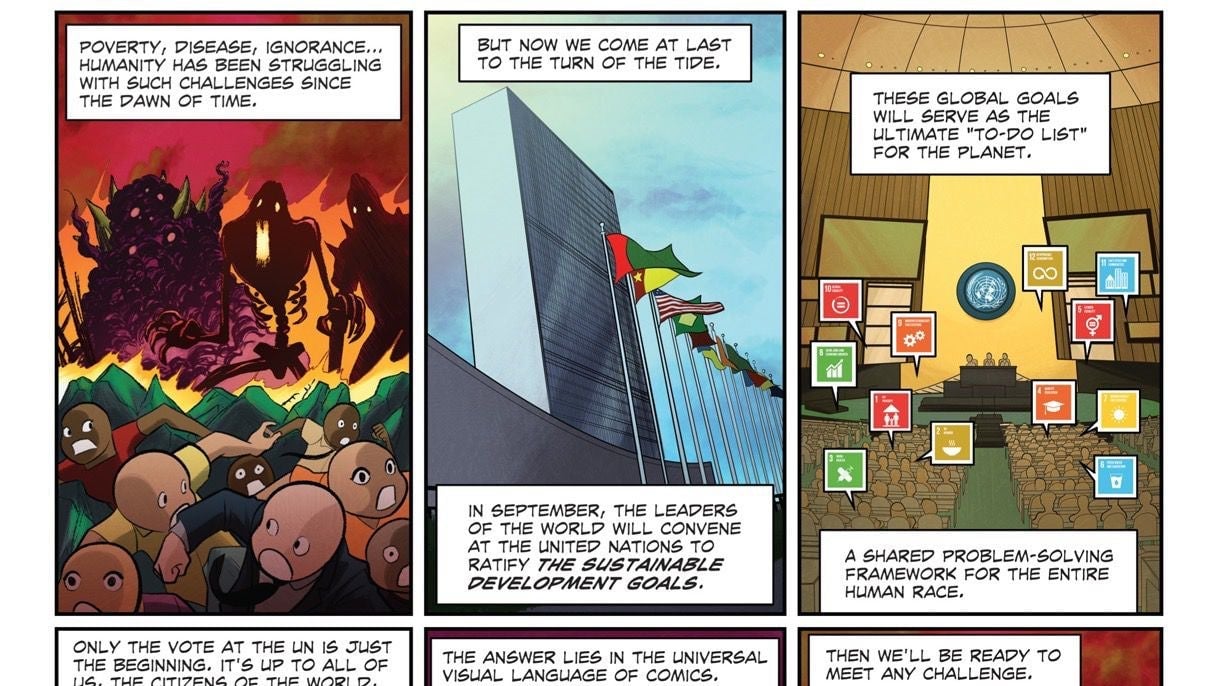A comic book project fights to save the world—with the United Nations as its trusty sidekick
Comic books can educate readers about on just about anything. Look no further than a manga guide to statistics, or The United States Constitution: A Graphic Adaptation.


Comic books can educate readers about on just about anything. Look no further than a manga guide to statistics, or The United States Constitution: A Graphic Adaptation.
Comics Uniting Nations is a new effort aiming to develop and distribute comic books to explain the United Nations’ mooted 17 global goals for sustainable development. Examples of those goals include:
- End poverty in all its forms everywhere
- Achieve gender equality and empower all women and girls
- Reduce inequality within and among countries
The United Nations will discuss the goals in September. Once member states agree to the draft, they will be expected to use the goals to frame their agendas and political policies over the next 15 years, starting in January 2016.
Explaining the goals, and spreading the word about them across borders, cultures, and classes, will help their chances of success. Politicians will feel more pressure to support the goals, the reasoning goes, if more people know about them. Hence the upcoming comic books.
Certainly, the culture now takes graphic novels seriously. As reported by The Atlantic, Art Spiegelman’s Maus won the Pulitzer Prize and David Small’s memoir Stitches was a finalist for National Book Award. Ivy League professors review graphic novels for The New York Times.
And they work: a 2013 study at the University of Oklahoma found that graphic novel readers retain more information versus traditional textbook users. Last year, the nonprofit Reading with Pictures and a partner released an anthology where each story is aligned with Common Core Standards to justify classroom use. Now it’s supporting Comics Uniting Nations, along with fellow nonprofits PCI Media Impact, Pvblic Foundation, and Project Everyone.

Josh Elder, a co-founder of Reading with Pictures, explained the value of comics in spreading the word about the UN’s goals in a Newsarama interview:
Comics are both digital and analog, so they can go anywhere. They traverse language barriers and bridge cultural divides. (Think about instruction manuals in airplanes or the signage in airports—it’s all comics and cartooned figures.) So if you’re trying to communicate something important to the broadest possible audience, comics are clearly the most superior medium possible.
Comics Uniting Nations works in coordination with various UN offices, but it’s an independent project seeking funds on Kickstarter. Assuming the project is funded—as of this writing it’s more than halfway to its goal of $60,000 with three days left—the finished comics will be distributed in digital formats for free worldwide under a Creative Commons license.
From there they could be printed and distributed by schools, libraries, and anyone else across the globe.